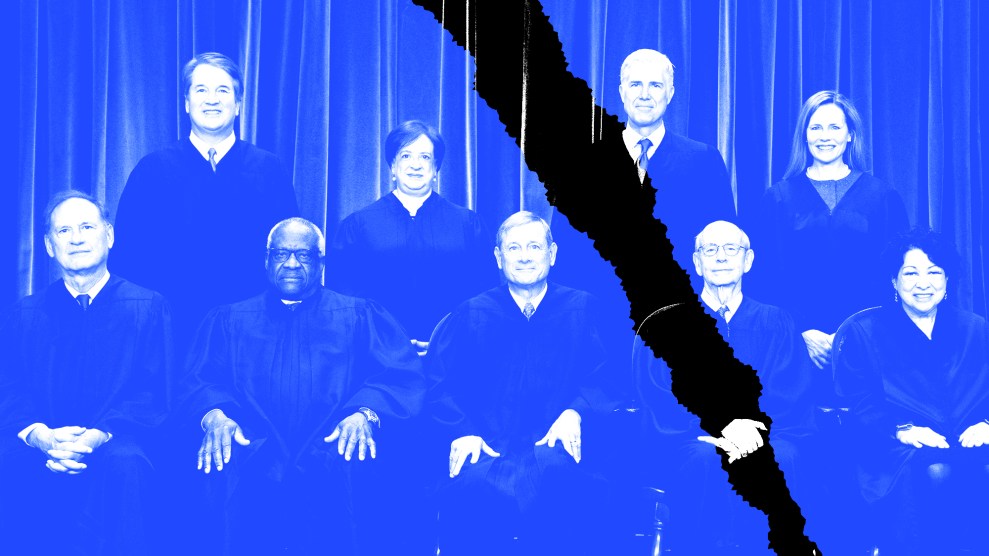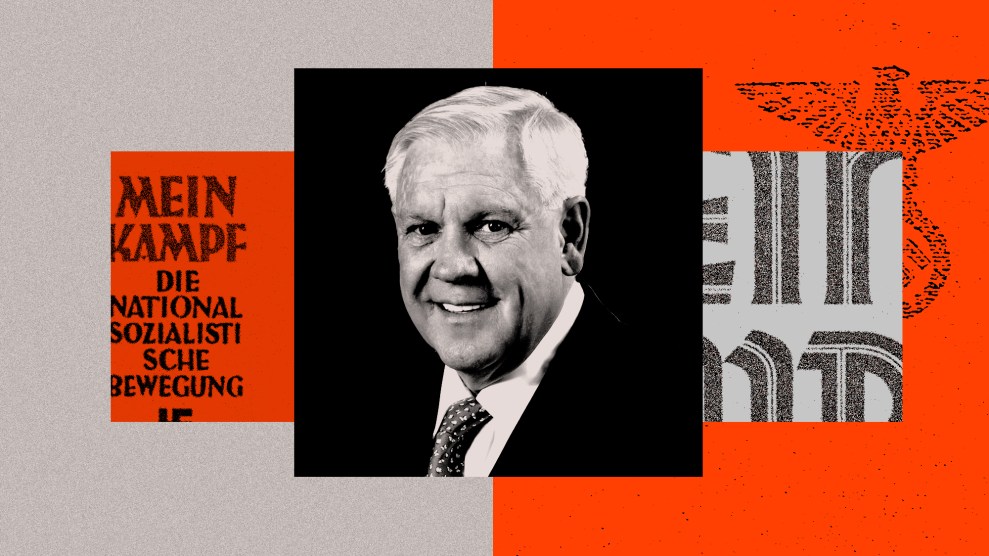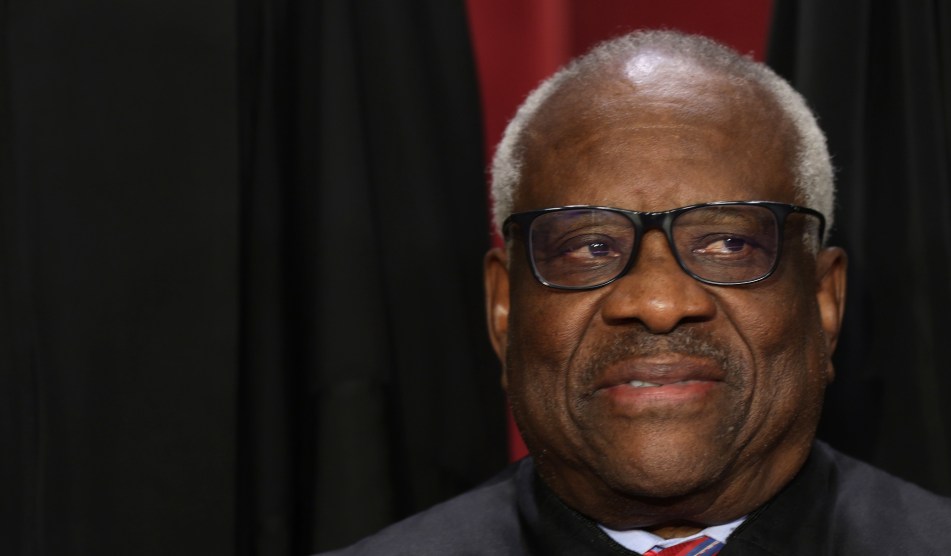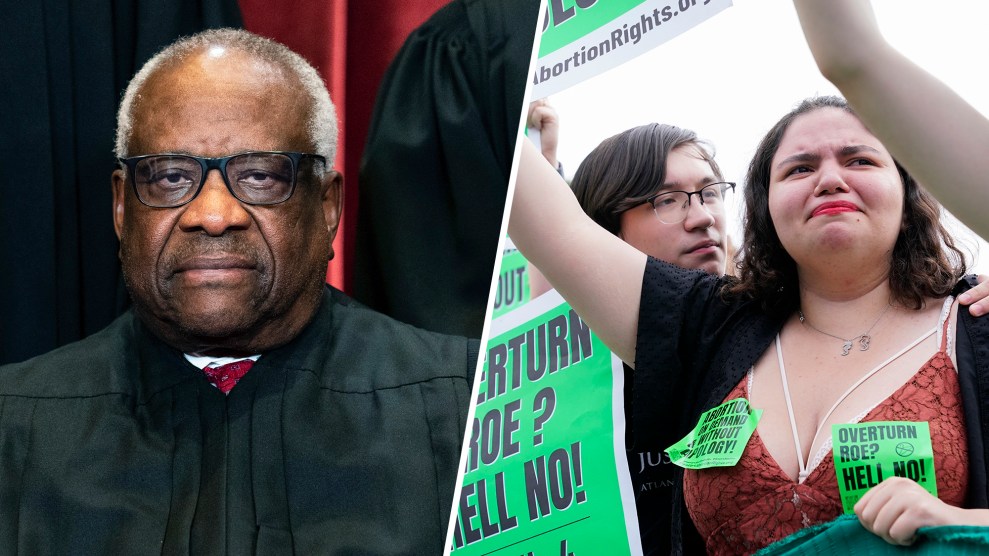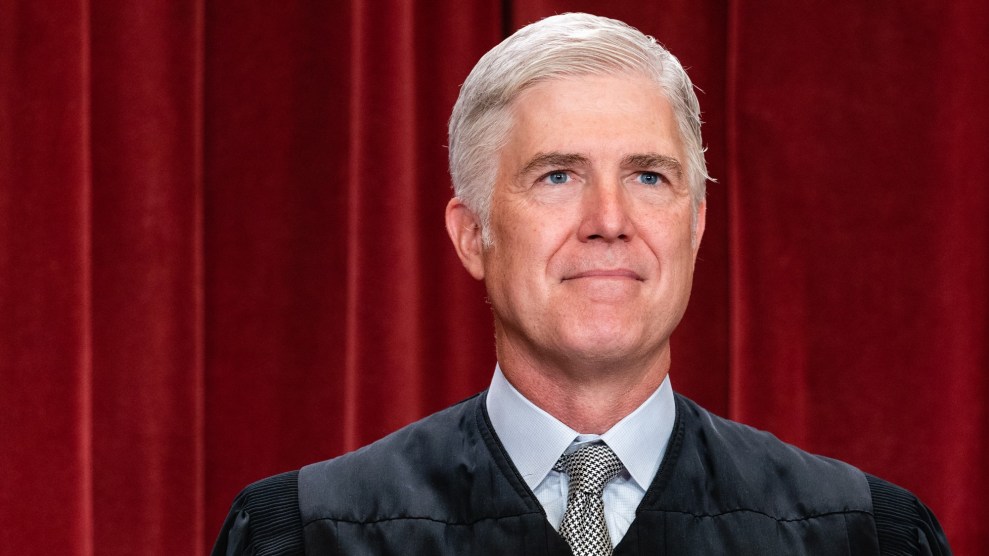
Eric Lee/Zuma
Conservative Supreme Court justices padded their salaries and took gigs abroad that one critic likened to “all-expenses-paid vacations, with a little teaching thrown in,” courtesy of a law school that used access to the justices to boost its fundraising and status, the New York Times reported Sunday.
The cozy ties of Justices Neil Gorsuch, Clarence Thomas, and Brett Kavanaugh to George Mason’s Scalia Law School appear to be legal. But the report is the latest revelation into how conservatives who control the court have regularly received money and lavish perks from ideological backers and people with interests before the court. Over the last few years, the court’s aggressive majority has raced to implement the agenda of such backers, notably in its decision last year tossing out Roe v. Wade. At a minimum, these relationships are a bad look. Many call them corrupt.
If you are having trouble keeping up, here is a quick summary of recent developments: The Times report follows a Business Insider story on Friday that revealed a whistleblower’s allegation that between 2007 and 2014, Chief Justice John Roberts’ wife, Jane, was paid $10.3 million in commissions to help them recruit top lawyers. Notably, she was paid largely by big law firms, many with business before the Supreme Court. This news came shortly after Justice Roberts refused to appear before the Senate Judiciary Committee to address the court’s ethics problems.
Days earlier, Politico reported that Brian Duffy, the chief executive of Greenberg Traurig, one of the nation’s biggest law firms, in 2017 bought a home that Gorsuch owned with two other people in Colorado for $1.8 million. Gorsuch reported making $250,000 to $500,000 on the sale. This connection, as Duffy claimed, may have been coincidental. But notably, in federal disclosure forms, Gorsuch opted not to disclose the purchaser of his property. And in reporting the income from the sale, Gorsuch said it came from an LLC he and the co-owners set up, rather than naming the guy who paid the money.
The Gorsuch news followed the bombshell revelation from ProPublica that Justice Thomas has long accepted lavish vacations and other expensive perks from Harlan Crow, a billionaire real estate heir with interests that were at least once before the court and a commitment to right wing causes, not to mention a collection of Nazi memorabilia. A second ProPublica story revealed that Crow had purchased several Savannah, Georgia properties from Thomas, paying Thomas, along with his sister and mother, $133,000. Thomas’ mother lives on one of the properties, which Crow also paid to renovate, rent-free.
Defenders of the court have suggested that the various reports of apparent corruption or at least lax ethics practices are part of a liberal plot to delegitimize the court. Still, the hits keep coming. The Times article outlines how, after Justice Antonin Scalia died in 2016, Leonard Leo, a plugged-in conservative known for his efforts to use dark money to push the judiciary rightward, brokered a deal in which George Mason’s law school, already attempting to stand out by positioning itself to the right of better known competitors, received a $30 million gift and renamed itself after the late justice.
The school cultivated new justices, offering them gigs teaching summer courses that usually ran for two weeks. Gorsuch and Kavanaugh pocketed nearly $30,000 for this work in recent years, close to the legal limit on certain outside income, according to the Times. They were also paid expenses to teach courses abroad. Gorsuch has taken expenses-paid gigs in Iceland and Padua, Italy. His expenses for the Italy trip, salary excluded, totaled close to $10,000, the Times found. “While our guests are with us, I expect them (from experience in Padua) to want to eat, drink and be merry with us (especially with NMG),” one of the coordinators wrote for the trip wrote in an email, referring to Gorsuch. Kavanaugh taught at a university outside London, where the law school helped lodge him in a cottage near the River Thames. Thomas also taught classes on the George Mason campus.
The justices helped the school raise money through their affiliation and other means: An October, 2016 event for the law school to mark the adoption of Scalia’s name, which was also a fundraiser, was slated to include remarks from Thomas and the late Justice Ruth Bader Ginsberg. A last minute objection by the court’s public information office caused the justices to scuttle their speeches, but they still attended. So did Justice Samuel Alito and Kavanaugh, then an appellate judge. The school highlighted the justices’ attendance in fundraising appeals.
The Times also reports that, despite a rule barring the judges from using court staff to assist with paid outside work, emails indicate that chambers staff for Gorsuch, Thomas, and Kavanaugh assisted with logistics for the justices’ teaching. Gorsuch’s staff even submitted his grades to the school.
The justices did not comment on the report, but the law school’s dean, Ken Randall told the Times: “When a justice is with us, we do everything we can to engage the justice with our students. Law schools serve students, and their education is undoubtedly enhanced by the justices teaching or visiting or speaking with students.”
A Scalia law school professor also helped Gorsuch look for a house in DC after his confirmation, and later went to work for him. The Scalia dean at the time, Henry Butler, appeared eager to capitalize on this tie. Butler repeatedly tried to get Gorsuch to meet with the head of a Montana-based property rights group with a stake in a case the court was then considering. Gorsuch does not seem to have responded to the requests.
The justices also relied on Scalia professors as “co-teachers” for their courses. And those professors, who presumably handled much of the administrative load of the teaching, have been active in submitting amicus briefs to the court to try to influence rulings. The Times notes that Thomas appeared to echo the arguments of one professor, with whom he was then teaching, in a dissenting opinion in 2022.
Amanda Frost, a law professor at the University of Virginia focused on ethics, told the Times that professors co-teaching with justices and then filing briefs in their SCOTUS cases risked “the appearance of impropriety.” There’s a been a lot of that of late.

